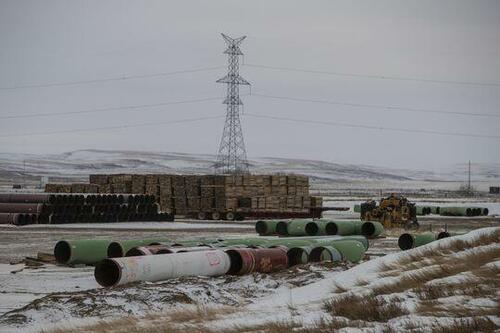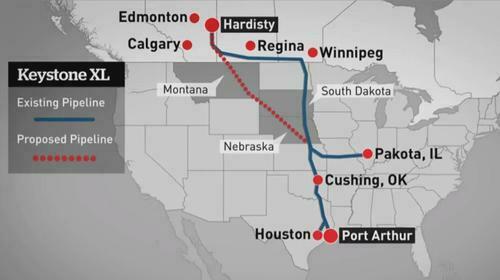Biden Admin Desperate For Canadian Oil… But Won’t Resurrect Keystone XL Pipeline
With Brent crude oil hovering around prices not seen since 2014 amid a geopolitical supply crunch, the Biden administration is looking to boost oil imports from Canada – but refuses to resurrect the Keystone XL pipeline that President Biden eliminated on his first day in office, according to the Wall Street Journal.
According to people familiar with the situation, no clear-cut solutions have emerged – with the most promising option appearing to be importing via rail, as well as increasing pressure on existing lines or installing larger pipelines along permitted routes.
That said, those options would provide limited relief because rail transport is expensive, and existing pipelines are at or near capacity. One such pipeline, Enbridge’s Mainline system, carries 2.85 million barrels of Canadian crude daily from Alberta to the Midwest – however company officials say it’s running at full capacity.
Canadian officials say expanding the Keystone XL pipeline network is the way to go – and would offer a larger, more efficient solution. The project would have carried 830,000 barrels a day of Canadian crude to Nebraska, and then on to refineries on the US Gulf Coast.
According to S&P Global Commodity analyst Kevin Birn, Canada has sufficient reserves to meet US demand – they just can’t efficiently deliver it. And of course, we can thank Biden’s ‘green’ decision to kill Keystone XL for the current predicament.
“There’s not a limitation in terms of resource potential,” said Birn, adding “There’s a limitation of capacity.”
With gasoline prices at near-record levels, President Biden last week ordered 180 million barrels of crude oil to be taken from the nation’s emergency reserves to increase supplies.
At the same time, White House officials say Mr. Biden has no interest in reviving the Keystone XL pipeline project. They say that it couldn’t be completed in time to address today’s shortfall and that the president is still committed to reducing greenhouse gas emissions from fossil fuels over the long term. -WSJ
The White House insists keeping Keystone XL alive wouldn’t have made a difference.
“While the U.S. continues to engage with a variety of producing countries to address the current supply imbalance we are seeing, the Keystone XL pipeline would have done little to nothing in addressing that supply,” said a spokesman, without elaboration.
One potential source of relief, Canada’s Trans-Mountain pipeline from Alberta, won’t be completed until the end of 2023, when it will be able to provide an additional 590,000 barrels per day to Canada’s West Coast, where it will then travel by ship to refineries in the US and Asia.
More expensive rail options would provide an additional 200,000 barrels a day – a fraction of the average 4.3 million barrels the country exported every day last year, according to the US Energy Information Administration.
One Canadian official pushing for the revival of Keystone XL is Alberta premier Jason Kenney, who’s criticized the Biden administration for looking at Venezuelan and Saudi oil over Canadian oil.
“We’re pleased to hear that there are discussions around enhancing North American energy security,” said a Kenney spokesman. “Instead of going cap in hand to the Saudis, Iranians and Venezuelans to replace Russian energy, instead of replacing dictator oil with dictator oil, come to your liberal democratic friends and allies in Canada.”
According to the report, Kenney spoke with moderate Democrat Sen. Joe Manchin of West Virginia last month to discuss options. Manchin notably asked Biden to reconsider his decision to scrap the Keystone XL project.
As a reminder, when Biden took office crude was $60 a barrel and gasoline averaged less than $2.40 a gallon in the US.
Tyler Durden
Tue, 04/05/2022 – 11:25
via ZeroHedge News https://ift.tt/Fsb8SwE Tyler Durden

